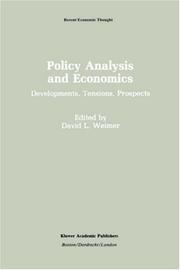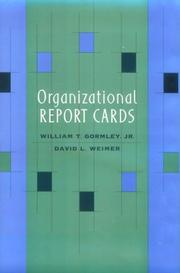| Listing 1 - 10 of 10 |
Sort by
|

ISBN: 0792391543 9401057206 9401138664 Year: 1991 Volume: vol *2 Publisher: Boston Kluwer Academic Publishers
Abstract | Keywords | Export | Availability | Bookmark
 Loading...
Loading...Choose an application
- Reference Manager
- EndNote
- RefWorks (Direct export to RefWorks)
Beleidswetenschappen --- Economic theory --- Economics --- Economie (Science) --- Economie (Wetenschap) --- Economische wetenschap --- Policy sciences --- Political economy --- Politieke economie --- Politique [Sciences de la ] --- Sciences de la politique --- Sciences économiques --- #SBIB:35H410 --- #SBIB:003.IO --- AA / International- internationaal --- 331.31 --- 330.00 --- Social sciences --- Economic man --- Policy-making --- Policymaking --- Public policy management --- Beleidscyclus: algemene werken --- Economisch beleid. --- Economische en sociale theorieën: algemeenheden. --- Economische en sociale theorieën: algemeenheden --- Economisch beleid --- Policy sciences. --- Economics.

ISBN: 067464350X Year: 1999 Publisher: Cambridge, Mass. Harvard University Press
Abstract | Keywords | Export | Availability | Bookmark
 Loading...
Loading...Choose an application
- Reference Manager
- EndNote
- RefWorks (Direct export to RefWorks)
#SBIB:052.IOS --- #SBIB:35H202 --- #SBIB:316.334.2A552 --- #SBIB:303H30 --- Overheidsmanagement: prestatiemanagement --- Partijen en strategieën in de onderneming: scientific management, tijds- een bewegingsstudies, beoordelingstechnieken, Taylorisme, kwaliteitsmanagement --- Kwalitatieve methoden: algemeen --- Public administration --- Organization theory --- United States --- Business policy --- Organizational effectiveness --- Evaluation --- Tableau de bord

ISBN: 0674272986 067464350X Year: 1999 Publisher: Harvard University Press
Abstract | Keywords | Export | Availability | Bookmark
 Loading...
Loading...Choose an application
- Reference Manager
- EndNote
- RefWorks (Direct export to RefWorks)
In recent years, consumers, professional organizations, government officials, and third-party payers have become increasingly concerned about how to assess the quality of the services provided by organizations in both the private and the public sectors. One new approach is the organizational report card, which compares the performance of organizations such as public schools, colleges, hospitals, and HMOs. This book offers the first comprehensive study of such instruments. It discusses the circumstances under which they are desirable alternatives to other policy instruments, such as regulation; how they should be designed; who is likely to use them and for what purpose; and what role, if any, government should have in their creation. Informed by cases drawn from education, health, and other policy areas, this book develops a conceptual framework for analyzing these issues. It explores the tradeoffs in measuring performance, the methods of communicating results effectively to mass and elite audiences, and the ways in which organizations respond to the data gathered.
Book
ISBN: 1009445502 1009445529 1009445545 1009445553 9781009445528 9781009445542 9781009445504 Year: 2024 Publisher: Cambridge, United Kingdom ; New York, NY : Cambridge University Press,
Abstract | Keywords | Export | Availability | Bookmark
 Loading...
Loading...Choose an application
- Reference Manager
- EndNote
- RefWorks (Direct export to RefWorks)
Archaeologists, anthropologists, and evolutionary biologists study the origins of our relationship with dogs and how it has evolved over time. Sociologists and legal scholars study the roles of dogs in the modern family. Veterinarian researchers address the relationship in the context of professional practice, yet economists have produced scant scholarship on the relationship between humans and dogs. Dog Economics applies economic concepts to relationships between people and dogs to inform our understanding of their domestication. It interprets their contemporary role as both property and family members and explores factors that affect the demand for dogs as well as market failures of the American puppy market. Offering economic perspectives on our varied relationships with dogs, this book assesses mortality risks and addresses end-of-life issues that commonly arise. It develops a framework for classifying canine occupations, considers the impact of pet insurance on euthanasia, and assesses the social value of guide dogs.
Dogs --- Economics --- Dog owners. --- Human-animal relationships --- Economic aspects. --- Social aspects. --- Psychological aspects.
Book
ISBN: 1009445537 9781009445559 1009445553 9781009445535 9781009445504 Year: 2024 Publisher: Cambridge, United Kingdom ; New York, NY Cambridge University Press
Abstract | Keywords | Export | Availability | Bookmark
 Loading...
Loading...Choose an application
- Reference Manager
- EndNote
- RefWorks (Direct export to RefWorks)
"Dog Economics provides an application of economic concepts to human-dog relationships that is accessible to a general audience with little, or even no, prior training in economics. People who keep dogs as well as scholars who do dog-related research will find that the book offers interesting new perspectives"
Dogs --- Economics --- Dog owners --- Human-animal relationships
Book
ISBN: 9780674272989 Year: 2022 Publisher: Cambridge, MA
Abstract | Keywords | Export | Availability | Bookmark
 Loading...
Loading...Choose an application
- Reference Manager
- EndNote
- RefWorks (Direct export to RefWorks)
Multi
ISBN: 9781009445504 9781009445559 9781009445535 Year: 2024 Publisher: Cambridge Cambridge University Press
Abstract | Keywords | Export | Availability | Bookmark
 Loading...
Loading...Choose an application
- Reference Manager
- EndNote
- RefWorks (Direct export to RefWorks)
Multi
ISBN: 9780674272989 Year: 2022 Publisher: Cambridge, Mass. Harvard University Press
Abstract | Keywords | Export | Availability | Bookmark
 Loading...
Loading...Choose an application
- Reference Manager
- EndNote
- RefWorks (Direct export to RefWorks)
Book
ISBN: 9781292021911 Year: 2014 Publisher: Harlow Pearson Education Limited
Abstract | Keywords | Export | Availability | Bookmark
 Loading...
Loading...Choose an application
- Reference Manager
- EndNote
- RefWorks (Direct export to RefWorks)
Book
ISBN: 9781108415996 9781108401296 Year: 2021 Publisher: Cambridge Cambridge University Press
Abstract | Keywords | Export | Availability | Bookmark
 Loading...
Loading...Choose an application
- Reference Manager
- EndNote
- RefWorks (Direct export to RefWorks)
| Listing 1 - 10 of 10 |
Sort by
|

 Search
Search Feedback
Feedback About UniCat
About UniCat  Help
Help News
News